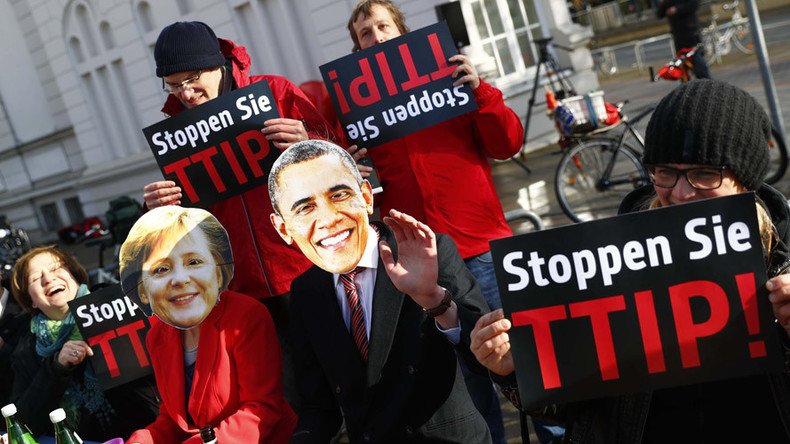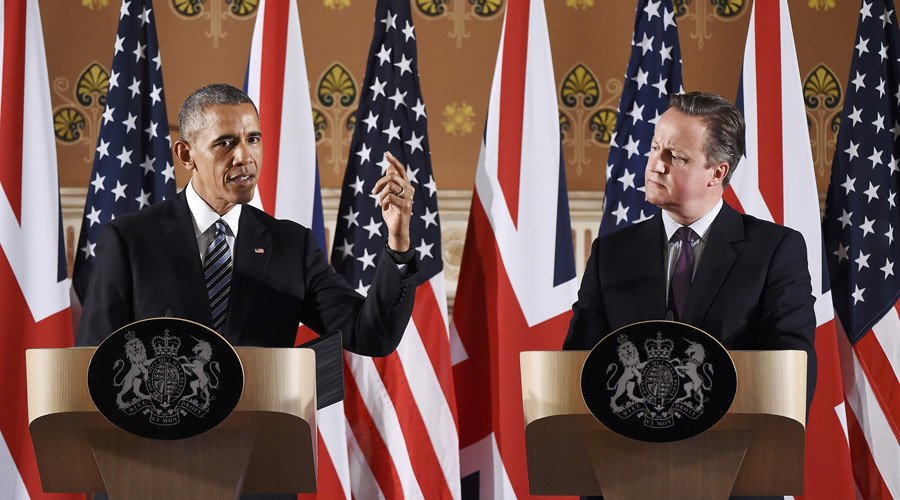Obama went to Germany to deliver Europe’s latest report card

Shouldn’t the days of European leaders enlisting the help of American presidents to sell unpopular ideas to their citizens be long over? They should. But evidently, they are not.
Barack Obama arrived in Europe last week, bursting with words of wisdom and friendly advice. He was welcomed enthusiastically by the leaders of the United Kingdom and Germany. Less enthusiastic, however, was the reception from the citizens of those countries.
Trouble in paradise?
In Germany, Obama arrived to tens of thousands protesting the hugely unpopular TTIP trade deal between the US and Europe, which is currently going through its 13th round of negotiations — negotiations which, by and large, have been carried out in secret between Brussels and Washington. TTIP is being sold as a vehicle to reduce tariffs and remove regulatory barriers to trade between the US and Europe — but protesters in Germany and elsewhere see the deal as a Trojan horse. They are worried that the jobs, growth and prosperity promised by its proponents will fail to materialize and that the arrangement will leave Europe at the mercy of wealthy multinationals who will degrade environmental and food standards to have them fall in line with the more lax approaches favored by the US. Essentially, they are justifiably unhappy with a deal which would give the US and big business greater control over EU regulatory laws.
Daily Mail on Obama in Germany #TTIPhttps://t.co/xRvNX017Yspic.twitter.com/ut3dQ41bJF
— Danielle Ryan (@DanielleRyanJ) 26 апреля 2016 г.
A couple of days earlier in London, Obama had campaigned forcefully against the UK leaving the European Union. It was no surprise of course that this was Washington’s stance — but it was a surprise for some that he resorted to threats, warning Brits that if they opt for a Brexit, they’d be pushed to “the back of the queue” in importance when it comes to trade deals with the US. His comments evoked the wrath of the ‘leave’ campaign, with London Mayor Boris Johnson baffled at the “very, very weird” interference and the inappropriateness of the American president giving a “lecture” to British citizens on a matter of domestic concern. Tory Justice Minister Dominic Raab didn’t mince words either, calling Obama’s comments “blackmail”. So much for that special relationship, eh?
Europe’s report card
Looking at Obama’s Hannover speech in full, it reads like a report card for Europe. He starts by listing off all of our shared values and producing a comprehensive rundown of what is possible when the US and Europe “stand as one” (translation: when European nations don’t question American policies or motivations). In other words, recognizing the deep divisions emerging in European politics and society, he pleads for the unity that will allow Washington to control the continent more easily if we’re all singing from the same hymn sheet.

But soon enough the niceties are over, it’s time to hear what we’ve all been doing wrong. Europe needs to do more to combat ISIS and terrorism. Europe needs to do more to address the consequences of globalization. And of course, Europe needs to stop slacking off when it comes to coughing up money for NATO. Sometimes, he says, Europe has “been complacent about its own defense.”
A cynic might posit that given the fact that the US uses NATO to control the foreign policy of 27 other countries, making sure it never strays from their own strategic interests, that it’s not entirely unfair for Washington to be the one picking up the slack. They are, after all, the country receiving the most benefit from the cushy arrangement.
Obama in Germany, watch German press, he's not having an easy ride from the people like he did in the sycophant UK. No to #TTIP. #bbcsp
— liarpoliticians (@liarpoliticians) 24 апреля 2016 г.
Overall, it was a bit like a teacher having to deliver a report to the parents of a child who’s doing fairly okay, but could be doing better. They start with the good news: Well, little Johnny is really doing well in English and History, but Science and Geography need serious work. Last year, Johnny’s report card was fantastic — and he mustn’t forget what he can do when he really puts his mind to it!
Well, some might say the United States could be doing a little better too, but they’re probably not going to invite us on a whistle stop tour of the state capitals to give lectures about what Europe feels is and is not working for American citizens. We certainly won’t find Merkel or Cameron arriving in Washington to relay a laundry list of things Americans are not doing right. But wouldn’t it be fun, all the same? Maybe Cameron could join Obama on the Truman Balcony to urge Congress to pass some decent gun control. Or maybe Merkel could make a speech in downtown Chicago, urging the police to stop shooting unarmed black people. Hollande could show up in Flint, Michigan and urge the provision of clean, safe water for citizens. You know, just as a friendly gesture.
Russia, Russia, Russia!
The word Russia appears eight times in Obama’s speech. Of course, he made sure to include the customary jab at Russian “aggression” in “flagrantly” violating the sovereignty of an independent nation, Ukraine. Russia’s “brute force” in Ukraine was out of line with “international order” which must be upheld, he said. Now, leaving aside debates on Russia’s role in the Ukrainian crisis, it is truly astonishing to witness a statement like that, given the US’s repeated willingness to throw international order straight out the window whenever it’s in the way of their greater hegemonic goals. The various catastrophes unleashed by illegal American invasions and military interventions over the last two decades, from Afghanistan to Iraq, to Libya and Syria make this kind of pontificating hard to stomach. But, I digress.
Another thinly veiled attack was directed at Vladimir Putin when he warned Europe to be suspicious of those who “claim to have the interests of Europe at heart and yet don't practice the very values that are essential to Europe.”
The word 'Russia' appeared 8 times in Obama's #Hannover speech - and that's not including all the other thinly veiled jabs and references.
— Danielle Ryan (@DanielleRyanJ) 26 апреля 2016 г.
Russia pops up again when he assures that economic sanctions must be kept firmly in place and again when he lectures Moscow on the true meaning of “greatness”. Greatness, he says, isn’t achieved by “bullying” but by working together. One must wonder if American foreign policy is about to undergo a massive overhaul if bullying has now been taken off the table as a suitable option.
But, where Russia was curiously absent was when it was time to dish out congratulations for the efforts in the fight against ISIS. Russia, naturally, got no mention there — despite the fact that by many accounts, it is Russia that has actually had more success in battling the terror group, including with one of the most major victories of the war to date in Palmyra. But, no need to mention that.
When is enough, enough?
@DanielleRyanJ@Backenricker It illustrates just how rudimentary they believe the majority of peoples' thought processing is.
— Ken Stone (@dkenstone) 25 апреля 2016 г.
Looking back on Obama’s few days of cajoling Europeans into doing what he wants, it’s pretty evident that fear-mongering efforts to refocus attention to Russia are going to fail — and the reason is simple. This is just not what the average European actually cares about. Tens of thousands weren’t out on the streets in Germany to protest “Russian aggression” — they were out to protest being forced into yet another initiative that they believe will harm their democracy, leave them with less power and at the mercy of American interests.
In The Netherlands, people voted overwhelmingly to reject an EU-Ukraine association agreement, and despite the Western inclination to pin that inconvenience on Russia too, the result was hardly Putin’s doing. Not that the Dutch government deigned to listen to its citizens anyway. In the UK, people will vote to leave the EU if they want to — and Russia and Putin will have absolutely nothing to do with it. Across Europe, far-right and far-left parties will rise and fall, as they always have, in response to the issues and crises of the day. Putin may like it or lump it, but he certainly won’t be at the helm pulling all the levers. To suggest so is ludicrous and infantile.
The message sent by the condescending tone of Obama’s visits to Germany and the UK was embarrassing: Europe still hasn’t figured out how to make its own decisions. They still need to be coaxed into doing the ‘right’ thing. Arms still need twisting. They still need the resident of the White House to come and pat them on the back when they’re doing well and berate them when they could be doing better.
European leaders apparently see nothing adverse in any of this. But European citizens are beginning to — and it’s about time.
The statements, views and opinions expressed in this column are solely those of the author and do not necessarily represent those of RT.













